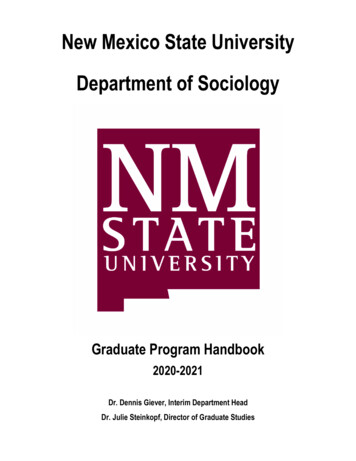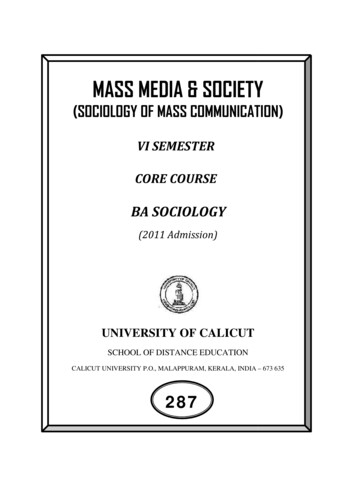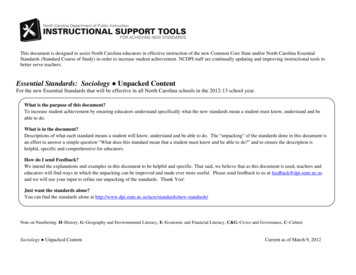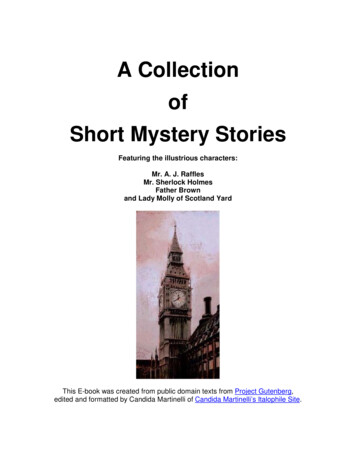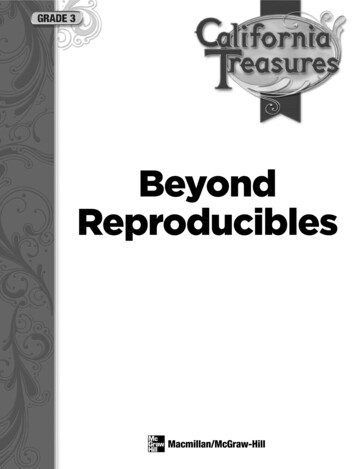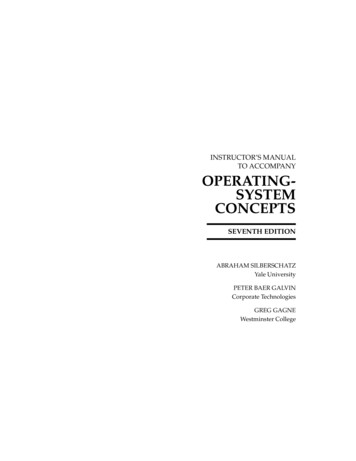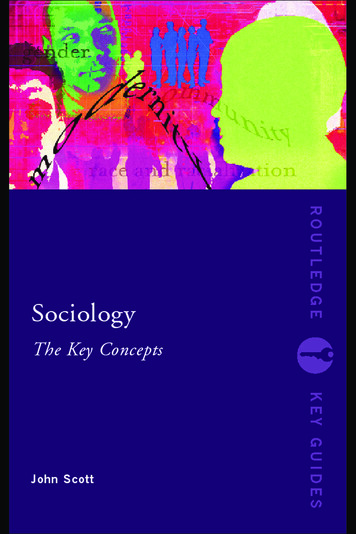
Transcription
SOCIOLOGYSociology: The Key Concepts brings together a strong group of wellknown experts to review ideas from all areas of this diverse and pluralisticdiscipline. Exploring the key debates and founding ideas of this exciting field of study, the book is fully cross-referenced and covers suchtopics as: CommunityChildhoodEmotionDiscourseRace and tionSocial capitalIdentityJohn Scott is a Professor of Sociology at the University of Essex.His most recent books include Power (2001), Sociology (with JamesFulcher, third edition, 2006) and Social Theory: Central Issues in Sociology(2006).
Also available from RoutledgeSociology: The BasicsMartin Albrow0–415–17264–0Key Quotations in SociologyK. Thompson0–415–05761–2Cultural Theory: The Key ThinkersAndrew Edgar and Peter Sedgwick0–415–23281–3Cultural Theory: The Key Concepts (Second edition)Edited by Andrew Edgar and Peter Sedgwick0–415–28426–0Habermas: The Key ConceptsAndrew Edgar0–415–30379–6The Routledge Companion to Feminism and PostfeminismEdited by Sarah Gamble0–415–24310–6The Routledge Companion to PostmodernismEdited by Stuart Sim0–415–33359–8
SOCIOLOGYThe Key ConceptsEdited by John Scott
First published 2006by Routledge2 Park Square, Milton Park, Abingdon, Oxon OX14 4RNSimultaneously published in the USA and Canadaby Routledge270 Madison Ave, New York, NY 10016Routledge is an imprint of the Taylor & Francis Group,an informa business 2006 John ScottThis edition published in the Taylor & Francis e-Library, 2006.“To purchase your own copy of this or any of Taylor & Francis or Routledge’scollection of thousands of eBooks please go to www.eBookstore.tandf.co.uk.”All rights reserved. No part of this book may be reprintedor reproduced or utilised in any form or by any electronic,mechanical, or other means, now known or hereafter invented,including photocopying and recording, or in anyinformation storage or retrieval system, withoutpermission in writing from the publishers.British Library Cataloguing in Publication DataA catalogue record for this book is available from the British LibraryLibrary of Congress Cataloging in Publication DataA catalog record for this book has been requestedISBN10: 0–415–34405–0 (hbk)ISBN10: 0–415–34406–9 (pbk)ISBN10: 0–203–48832–6 (ebk)ISBN13: 978–0–415–34405–0 (hbk)ISBN13: 978–0–415–34406–7 (pbk)ISBN13: 978–0–203–48832–4 (ebk)
CONTENTSList of Key ConceptsContributorsIntroductionviiixxviiKEY CONCEPTS1Glossary of theoretical approachesIndex197208v
LIST OF KEY CONCEPTSAction and agencyAlienationAnomieBureaucracyCapitalismChange and developmentChildhoodCitizenshipCivil societyClassCollective tural capitalCultureDefinition of the situationDevianceDiscourseDivision of labourDomestic tusHybridityIdeology and hegemonyIndustrialismvii
LIST OF KEY CONCEPTSInstitutionKinship, family and gration and diasporasMobilityModernisation and developmentModernityNarratives and accountsNationOrganisationPatriarchyPoverty and inequalityPowerRace and racialisationRational actionRationalisationReligionRoleSelf and identitySex and sexualitySocial capitalSocial movementsSocial structureSocial cultureSurveillanceTime and spaceTradition and traditionalismUnderclassUrbanismWorld systemsviii
CONTRIBUTORSStephen Ackroyd Professor of Organisational Analysis in theUniversity of Lancaster Management School. Specialising inpublic sector organisations and strategic organisation, his mostrecent publications include The Organization of Business: ApplyingOrganizational Theory to Contemporary Change (Oxford UniversityPress, 2002) and Critical Realist Applications in Organisation andManagement Studies (with S. Fleetwood, Routledge, 2004).Alan Aldridge Reader in the Sociology of Culture in the Schoolof Sociology and Social Policy at the University of Nottingham.His publications include Religion in the Contemporary World (PolityPress, 2000), Consumption (Polity Press, 2003) and The Market (PolityPress, 2005).Meryl Aldridge Reader in the Sociology of News Media in theSchool of Sociology and Social Policy at the University ofNottingham. Her publications include ‘The ties that divide: regionalpress campaigns, community and populism’, Media, Culture andSociety (2003), ‘Rethinking the concept of professionalism: the caseof journalism’, British Journal of Sociology (with J. Evetts, 2003) and‘Teleology on Television? Implicit models of evolution in broadcastwildlife and nature programmes’, European Journal of Communication(with R. Dingwall, 2003).Graham Allan Professor of Sociology at the University of Keele,having previously taught at the University of Southampton. Hisrecent publications include The State of Affairs: Explorations in Infidelityand Commitment (joint editor with J. Duncombe, K. Harrison andD. Marsden, Erlbaum, 2004), Social Networks and Social Exclusion(joint editor with C. Phillipson and D. Morgan, Ashgate, 2004) andFamilies, Households and Society (with Graham Crow, Palgrave, 2001).ix
CONTRIBUTORSRobin Blackburn Professor of Sociology at the University of Essex,having studied and taught at the LSE and Oxford in the 1960s.He has been a member of the editorial committee of New Left Reviewsince 1962 and was Editor from 1981 to 1999. He has been consulting editor of Verso since 1970. Research interests includecomparative investigations of slavery and of contemporary financialinstitutions. His publications include The Making of New WorldSlavery: From the Baroque to the Modern (Verso, 1997), The Overthrowof Colonial Slavery (Verso, 1988) and Banking on Death. Or, Investingin Life: The History and Future of Pensions (Verso, 2002).Joan Busfield Professor of Sociology at the University of Essex, shetrained initially as a clinical psychologist at the Tavistock Clinic. Herresearch has focused on psychiatry and mental disorder, and hermain publications include Managing Madness: Changing Ideas andPractice (Hutchinson, l986), Men, Women and Madness (Macmillan,1996) and Health and Health Care in Modern Britain (OxfordUniversity Press, 2000). She is the editor of Rethinking the Sociologyof Mental Health (Blackwell, 2001).Eamonn Carrabine Senior Lecturer at the Department of Sociologyat the University of Essex. His teaching and research interests liein the fields of criminology and cultural studies. His books includeCrime in Modern Britain (with Pamela Cox, Maggy Lee and NigelSouth, Oxford University Press, 2002), Criminology: A SociologicalIntroduction (with Paul Iganski, Maggy Lee, Ken Plummer, NigelSouth, Routledge, 2004) and Power, Discourse and Resistance: AGenealogy of the Strangeways Prison Riot (Ashgate, 2004). He is currentlyworking on a book on Crime and the Media: Interrogating Representationsof Transgression in Popular Culture.Nickie Charles Professor and Director of the Centre for the Study ofWomen and Gender in the Sociology Department at the Universityof Warwick. She has recently completed a restudy of research intothe family and social change carried out in the 1960s in Swansea andis currently working on the book of the project. With colleagues atSwansea she is about to start work on a new, ESRC-funded project,‘Gender and political processes in the context of devolution’ whichwill take devolved government in Wales as a case study. She is theauthor of Gender in Modern Britain (Oxford University Press, 2002).Amanda Coffey Senior Lecturer at the School of Social Sciences atCardiff University. Her research interests include young people andtransitions to adulthood, education, labour markets and the sociologyx
CONTRIBUTORSof gender. Her publications include Education and Social Change(Open University Press, 2001) and Reconceptualizing Social Policy(Open University Press, 2004).Robin Cohen Professor of Sociology at the University of Warwick.His notable titles in the field of migration are Frontiers of Identity: TheBritish and The Others (1994), The Cambridge Survey of World Migration(edited, 1995) and Global Diasporas: An Introduction (first publishedin 1997, with many subsequent editions and translations). Hisforthcoming book is titled Migration and its Enemies.Graham Crow Professor of Sociology at the University ofSouthampton, where he has worked since 1983. His research interestsinclude the sociology of families and communities, sociologicaltheory and comparative sociology. His most recent book is The Artof Sociological Argument (Palgrave, 2005).Fiona Devine Professor of Sociology at the University of Manchester,having previously been a Researcher at the Department ofEmployment and the PSI and taught at the University of Liverpool.She is the author of Affluent Workers Revisited: Privatism and theWorking Class (Edinburgh University Press, 1992), Social Classin America and Britain (Edinburgh University Press, 1997), SociologicalResearch Methods in Context (with Sue Heath, Macmillan, 1999)and Class Practices: How Parents Help Their Children Get Good Jobs(Cambridge University Press, 2004).Jean Duncombe Principal Lecturer at the School of Social Studies atUniversity College Chichester, where she is Head of ChildhoodStudies and works on issues of family and long-term relationships.She is a member of the editorial board of the journal Sexualities andis the joint editor of The State of Affairs: Explorations in Infidelity andCommitment (with K. Harrison, G. Allan and D. Marsden, Erlbaum,2004).John Field Director of the Division of Academic Innovation andContinuing Education, University of Stirling. His research interestsinclude lifelong learning, vocational education and training and socialcapital. He is the author of Social Capital (Routledge, 2003).James Fulcher Senior Lecturer in Sociology at the University ofLeicester. With John Scott he has recently published Sociology (2ndedn, Oxford University Press, 2003) and he is the author of Capitalism:A Very Short Introduction (Oxford University Press, 2004).xi
CONTRIBUTORSMiriam Glucksmann Professor of Sociology at the University ofEssex, having previously taught at South Bank University, BrunelUniversity and the University of Leicester. Her principal publications include Structuralist Analysis in Contemporary Social Thought(Routledge, 1974), Women on the Line (as Ruth Cavendish,Routledge, 1982), Women Assemble: Women Workers and the ‘NewIndustries’ in Inter-war Britain (Routledge, 1990) and Cottons andCasuals: The Gendered Organisation of Labour in Time and Space(Sociologypress, 2000).Chris Harris Emeritus Professor of Sociology at the University ofWales Swansea. His principal publications are The Family and SocialChange (with Colin Rosser, Routledge and Kegan Paul, 1965),Family (Allen and Unwin, 1969), The Family and Industrial Society(Allen and Unwin, 1983) and Kinship (Open University Press, 1990).David Howarth Senior Lecturer in Government, University of Essex.He specialises in discourse theory, South African politics and socialmovements. His publications include Discourse (Open UniversityPress, 2000), South Africa in Transition (edited with Aletta Norval,Macmillan, 1998) and Discourse Theory in European Politics: Identity,Policy and Governance (edited with Jacob Torfing, Palgrave, 2005).Ian Hutchby Professor of Communication at Brunel University.His work in conversation analysis is widely known and he is the authorof, among others, Confrontation Talk: Arguments, Asymmetries and Poweron Talk Radio (Lawrence Erlbaum Associates, 1996), ConversationAnalysis (with Robin Wooffitt, Polity, 1998), Conversation andTechnology (Polity, 2001) and Media Talk: Conversation Analysis and theStudy of Broadcasting (Open University Press, 2005).Stevi Jackson Professor and Director of the Centre for Women’sStudies, University of York. Her teaching and research interestsinclude feminist theory, theories of gender and sexuality, familyrelationships and the sociology of childhood. She is the authorof Childhood and Sexuality (Blackwell, 1982), Christine Delphy (Sage,1996) and Concerning Heterosexuality (Sage, 1999), and she is editorof Contemporary Feminist Theories (with Jackie Jones, EdinburghUniversity Press, 1998) and Gender: A Sociological Reader (with SueScott, Routledge 2002).Ronald Jacobs Associate Professor of Sociology at the Universityat Albany, State University of New York. His research exploresthe relationship between media, public culture and civil society. Hexii
CONTRIBUTORSis the author of Race, Media, and the Crisis of Civil Society: From Wattsto Rodney King (Cambridge University Press, 2000).Ray Kiely Senior Lecturer in Development Studies, SOAS, Universityof London. His most recent books are The Clash of Globalizations(Brill, 2005) and Empire in the Age of Globalization (Pluto, 2005).Jorge Larrain Head of the Department of Social Sciences, AlbertoHurtado University, Santiago, Chile. Former Head of the Department of Cultural Studies and Emeritus Professor of Sociology,University of Birmingham, UK. He is the author of several bookson ideology, including The Concept of Ideology (Hutchinson, 1979),Ideology and Cultural Identity: Modernity and the Third World Presence(Polity Press, 1994) and Identity and Modernity in Latin America (PolityPress, 2000).Maggy Lee Senior Lecturer in the Department of Sociology,University of Essex. Her main areas of research include internationalmigration and trafficking; public and private policing; youth crimeand justice. Recent publications include Youth, Crime and Police Work(Macmillan, 1998), Crime in Modern Britain (with Carrabine et al.,Oxford University Press, 2002) and Criminology: A SociologicalIntroduction (with Carrabine et al., Routledge, 2004).David McCrone Professor of Sociology and Director of the Instituteof Governance at Edinburgh University. His early work in urbansociology was followed by research on the sociology of Scotlandand the comparative sociology of nationalism and national identity.His books include The City: Patterns of Domination and Conflict (withBrian Elliott, Macmillan, 1982), Property and Power in a City (withBrian Elliott, Macmillan, 1989), Scotland the Brand: the Making ofScottish Heritage (Edinburgh University Press, 1995), UnderstandingScotland: the Sociology of a Nation (Routledge, 2001; 2nd edn) andThe Sociology of Nationalism: Tomorrow’s Ancestors (Routledge, 1998).With Lindsay Paterson and Frank Bechhofer he has published Livingin Scotland: Social and Economic Changes since 1980 (EdinburghUniversity Press, 2004).John MacInnes Reader in Sociology at Edinburgh University andInvestigador at the Centre d’Estudis Demogràfics, UniversitatAutònoma de Barcelona. When his three-year-old daughter lets him,he researches the gender, national and class dimensions of ‘identity’,and the relation between demography and sociology. His last bookwas The End of Masculinity (Open University Press, 1998) while hisxiii
CONTRIBUTORSnext one, written with with Julio Pérez, is The Reproductive Revolution(Routledge, forthcoming).David Maines Professor of Sociology at Oakland University inMichigan, having previously taught at Wayne State University andPennsylvania State University. His research interests include urbansociology, stratification, interactionism, narrative. In addition to anumber of landmark papers on narrative, including ‘Narrative’smoment and sociology’s phenomena: toward a narrative sociology’(The Sociological Quarterly 34, 1993) and ‘Writing the self vs writingthe other: comparing autobiographical and life history data’ (SymbolicInteraction, 24, 2001), he is the author of The Faultline of Consciousness:A View of Interactionism in Sociology (Aldine de Gruyter, 2001).Colin Mills University Lecturer in Sociology at the Universityof Oxford and Fellow of Nuffield College. His interests are in thesociology of work and employment, social stratification, social surveymethods and quantitative methods. His most recent book is Cradleto Grave: Life-Course Change in Modern Sweden (edited with J. Jonsson,2001, Sociology press).Lydia Morris Professor of Sociology at the University of Essex. Sheis the author of The Workings of the Household (Polity Press, 1991),Dangerous Classes (Routledge, 1994), Social Divisions (UCL Press,1995) and Managing Migration (Routledge, 2002).Chris Pickvance Professor of Urban Studies at the University ofKent, Canterbury. His books include State Restructuring and LocalPower: Comparative Perspectives (ed. with E. Preteceille, Pinter, 1990),Environmental and Housing Movements: Grassroots Experience in Hungary,Estonia and Russia (ed. with K. Lang-Pickvance and N. Manning,Avebury, 1997) and Local Environmental Regulation in Post-socialism: AHungarian Case Study (Ashgate, 2003).Lucinda Platt Lecturer in Sociology at the University of Essex. Authorof Parallel Lives? Poverty among Ethnic Minority Groups in Britain(CPAG, 2002) and Discovering Child Poverty (The Policy Press, 2005),her research focuses on ethnic minority disadvantage and on childpoverty.George Ritzer Distinguished University Professor at the Universityof Maryland. He is best known for his work in social theory and inthe application of theory to the social world, especially consumption.His numerous publications include The McDonaldization of Society(Pine Forge Press, 1992 and 1996), The McDonaldization Thesis (Pinexiv
CONTRIBUTORSForge Press, 1998), Expressing America (Pine Forge Press, 1995) andEnchanting a Disenchanted World: Revolutionizing the Means ofConsumption (Pine Forge Press, 1999). His most recent book is TheGlobalization of Nothing (Pine Forge Press, 2004).Carlo Ruzza Associate Professor of Sociology at the Università diTrento, having previously taught at Essex University, the Universityof Surrey and Harvard University. He studies environmentalism,social movements and civil society and is the author of Europeand Civil Society: Movement Coalitions and European Governance(Manchester University Press, 2004).John Scott Professor of Sociology at the University of Essex, havingpreviously been Professor at the University of Leicester. Specialisingin social stratification, economic sociology and social theory, his mostrecent books include Power (Polity Press, 2001), Sociology (with JamesFulcher, second edn, 2003) and Social Theory: Central Issues inSociology (Sage, 2006).Susie Scott Lecturer in Sociology at the University of Sussex, withresearch interests in interaction, performance and everyday life. Herpublications include various articles on shyness and a forthcomingbook, Shyness and Society (Palgrave, 2007).Leslie Sklair Professor of Sociology at the London School ofEconomics and Political Science. His recent books include TheTransnational Capitalist Class (Blackwell, 2001) and Globalization:Capitalism and its Alternatives (3rd edn, Oxford University Press,2002). These and other books have been translated into sevenlanguages. He is Vice-President for Sociology of the Global StudiesAssociation.Stephen Small Associate Professor of African American Studies atUniversity of California, Berkeley. He has previously taught at theUniversity of Massachusetts, Amherst, and at the Universitiesof Warwick and Leicester. His recent publications include Representations of Slavery. Race and Ideology in Southern Plantation Museums(co-written with Jennifer Eichstedt, Smithsonian Institution Press,2002) and Race and Power: Global Racism in the Twenty-First Century(co-written with Gargi Bhattacharyya and John Gabriel, Routledge,2004).Rob Stones Senior Lecturer in Sociology at the University of Essex.His research interests include social theory and structuration theoryin particular, documentary and fiction films in relation to the publicxv
CONTRIBUTORSsphere, and the nature of experience in late modernity. He haspublished Structuration Theory (Palgrave, 2004) and SociologicalReasoning: Towards a Past-modern Sociology (Macmillan, 1996) and hehas edited Key Sociological Thinkers (Macmillan, 1998).Piotr Sztompka Professor of Theoretical Sociology at the JagiellonianUniversity at Krakow, Poland, and the current President of theInternational Sociological Association (ISA). He is the author ofTrust: A Sociological Theory (Cambridge University Press, 1999) andco-author of Cultural Trauma and Collective Identity (with Jeffrey C.Alexander, Ron Eyerman, Bernhard Giesen and Neil J. Smelser,University of California Press, 2004).John Urry Professor of Sociology at Lancaster University. His mostrecent publications include Sociology Beyond Societies (Polity, 2000),Bodies of Nature (co-edited with Phil Mcnaghten, Sage, 2001), TheTourist Gaze. Second Edition (Sage, 2002), Global Complexity (Polity,2003), Tourism Mobilities (co-edited with Mimi Sheller, Routledge,2004), Performing Tourist Places (with Jørgen Ole Bærenholdt, MichaelHaldrup, Jonas Larsen 2004) and Automobilities (edited with MikeFeatherstone and Nigel Thrift, Sage, 2005).Sylvia Walby Professor in the Department of Sociology, LancasterUniversity. She has been Professor of Sociology at the Universitiesof Leeds and Bristol. Her books include: Gender Transformations(Routledge, 1997), Theorizing Patriarchy (Blackwell, 1990), Patriarchyat Work (Polity Press, 1986) and Complex Social Systems: Theorizationsand Comparisons in a Global Era (Sage, 2006 forthcoming).Pnina Werbner Professor of Social Anthropology at Keele University.Her authored books include the ‘Migration trilogy’ (The MigrationProcess, Berg, 1990/2002, Imagined Diasporas, James Currey/SAR, 2002 and Pilgrims of Love: The Anthropology of a Global SufiCult, Hurst, 2003). She has edited and written extensively on citizenship, multiculturalism and cultural hybridity, and she is currentlyresearching women and the changing public sphere in Botswana.xvi
INTRODUCTIONSociology is a diverse and pluralistic discipline. There are a variety ofsocially located standpoints, each with its own truths and an equal rightto be heard in sociological debates. For this reason, no single andcoherent body of ideas acceptable to all practitioners can be set down.Many commentators have drawn the conclusion that sociologicalconcepts are, therefore, ‘essentially contested’: that there can be noagreed and binding definition of any of the principal concepts used bysociologists in their research. This would seem to pose serious problemsfor anyone attempting to compile a dictionary or glossary of sociologicalconcepts: can there be any agreement over what are the ‘key’ conceptsand how they should be defined?This is not, however, the counsel of despair that it might seem. Thediversity and plurality of sociology is one of the things that gives it itsattraction as a discipline – there is nothing quite like a good argumentand a gathering of sociologists is guaranteed to provide many. More thanthis, however, the range and scope of conceptual disagreement is not asgreat as might be feared. Sociology may – like Mao’s over-optimisticview of Chinese intellectual life – ‘let a thousand flowers bloom’, but theconcepts that bloom in the sociological world are drawn from a relativelysmall number of theoretical positions and these are far from beingincommensurable with each other. Sociological theories are not derivedfrom isolated and hermetically sealed worldviews: they overlap and interpenetrate in a whole variety of ways and there are many hybrid andcomposite theories that combine elements from a number of approaches.Our theories are plural standpoints on an independently existingreality that can never be known as it really is, in all its complexity. Wealways select what we are interested in from a particular standpoint, andthe standpoints from which we build our theories are located within thevery social world that we study. Nevertheless, the various views takenof this reality, taken together, can provide a more comprehensive picturexvii
INTRODUCTIONof the social world than any one can provide on its own. Each perspective has its validity and authenticity within the larger picture. Thevariety of perspectives that we can take towards a physical landscape areauthentic descriptions of the landscape from the particular standpointsadopted, and the same is true of our perspectives on the social world.Just as we attain a wider understanding of the landscape when werecognise the diversity of perspectives from which it can be seen andattempt to understand the limitations of each, so we can move towardsa combination of divergent sociological perspectives. This combinationof perspectives occurs through dialogue. It is through such dialogue anddebate that the limitations of each perspective can be appreciatedand more comprehensive understandings can be formulated.The concepts available for sociological use, therefore, reflect thecurrently achieved outcome of such dialogues. ‘Essentially contested’ inprinciple, sociological concepts are actually contested in the empiricallyoriented practice of cooperating and communicating professionals.Conceptual innovation occurs not simply within a particular theoreticalapproach but within a particular state of disciplinary dialogue. Thedevelopment of sociological knowledge may not be neatly cumulative– indeed, this is not even the case in the natural sciences – but the development of the discipline has seen the building of islands of conceptualagreement that form the vast archipelago of understanding.It is from this basis that my selection of key concepts has been made.I have attempted to identify concepts from all areas of the discipline andto choose those that are sufficiently broad and general to have a wideapplication and relevance. Nevertheless, the number of such conceptsis immense and some way of selecting the ‘key’ concepts had to beadopted. My initial long list of concepts was circulated to a number offriends and colleagues, especially those from the large and intellectuallydiverse department in which I work at the University of Essex. Thesecolleagues were asked to indicate which concepts they would add to mylist and which they regarded as of greater and lesser importance. Thesecomments and suggestions helped me to reduce the list to a manageablelength for a book in which the various contributors could say somethingsensible and useful about the various concepts and in which the wholeadds up to something greater than the individual parts.Each contributor to the book was chosen as a leading sociologist intheir area, and they have generally sought to indicate the range of agreement and disagreement that surrounds the various concepts. They were,however, encouraged to express their own views and interpretations.The final selection, however, is mine and reflects my view of the currentstate of the discipline. Many will, no doubt, disagree with my selection,xviii
INTRODUCTIONbut I am comforted by the assured knowledge that anybody else’sselection would raise equally strong objections. As the old saying goes,‘you can’t please all of the people all of the time’. I hope, however, thatI have managed to please a large number of people for at least some ofthe time.No selection can avoid making arbitrary decisions, simply because ofthe lack of space to include the many more concepts that could havebeen considered. The book embodies my selection of what I regard asthe key concepts in sociology today, even though I may, like many othercontributors, disagree with some of the conclusions drawn. I have feltuncomfortable about excluding many concepts that others will regardas important or essential. In many cases, however, such concepts appearindirectly within other entries. I have, for example, included an entryon masculinity but not one on femininity. These are closely relatedconcepts and both are alluded to in the general discussions of gender andsexuality. Many of the issues raised in relation to the study of masculinityrelate also to femininity, but masculinity is, at the moment, the focusof the most far-reaching debates and seemed the obvious concept toinclude. I am sure that readers will find other, equally arbitrary, choices,but I hope that it will be realised that such choices are inevitable andthat many ‘missing’ concepts appear in and through related entries. Thebook provides the tools that are needed to discuss these questions andto problematise the narratives offered. The concepts chosen are amongthe most important available for sociological work and they must figurein any serious discussion of contemporary societies.The bulk of the book comprises an A to Z listing of the key concepts,each discussion being followed by a selection of further reading for thosewho wish to pursue the issue at greater length. I have included crossreferences between entries – indicated in bold – to help you to navigatearound the text, but I have not attempted to cross-refer all the numeroususes of the concepts in the various entries. Entries generally indicate themain contributors to the debates around each concept. Where theirworks have not been included in the Further Reading, they should beeasily identifiable through author searches in library catalogues andonline resources. The book ends with a glossary of the key theoreticalperspectives current in sociology. The list is not exhaustive but coversthe main theories that figure in debates over the concepts exploredin the main part of the book. These glossary entries give merely thebeginning of an account of theoretical disputes, and interested readerswill find the ideas of the key theorists examined in two companionvolumes, 50 Key Sociologists: The Formative Theorists and 50 KeySociologists: The Contemporary Theorists.xix
INTRODUCTIONFurther readingLevine, Donald N. (1995) Visions of the Sociological Tradition. Chicago: Universityof Chicago Press.Scott, John (1998) ‘Relationism, cubism, and reality: beyond relativism’ in TimMay and Malcolm Williams (eds) Knowing the Social World. Buckingham:Open Un
Sociology: The Key Conceptsbrings together a strong group of well-known experts to review ideas from all areas of this diverse and pluralistic discipline. Exploring the key debates and founding ideas of this excit-ing field of study, the book is full
